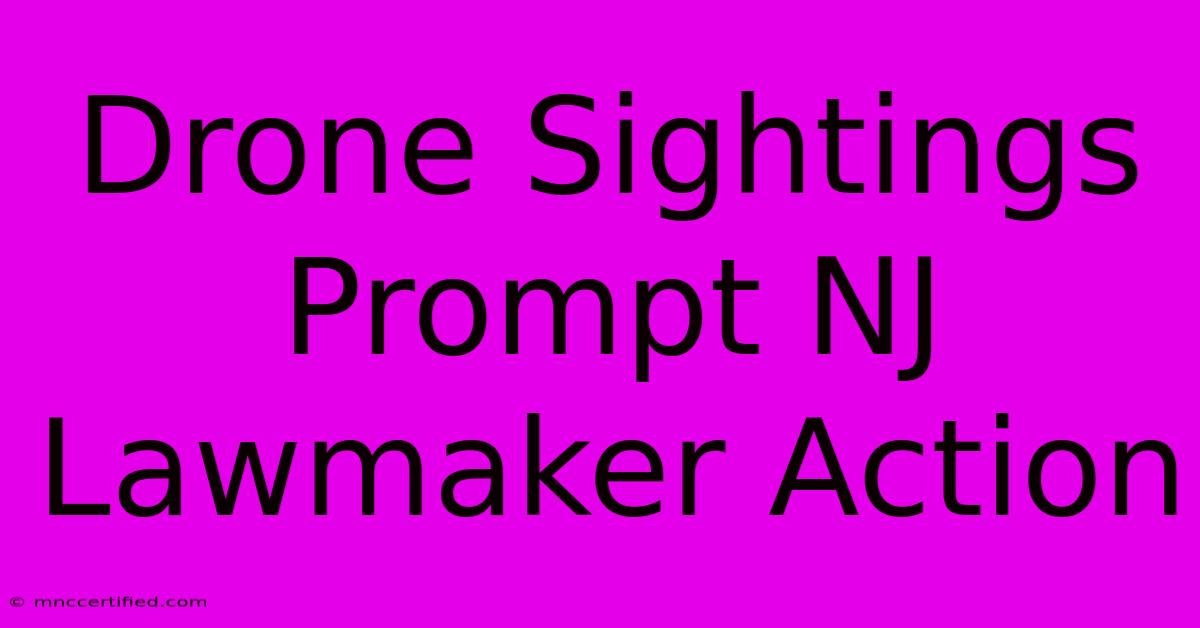Drone Sightings Prompt NJ Lawmaker Action

Table of Contents
Drone Sightings Prompt NJ Lawmaker Action: New Regulations on the Horizon?
The increasing frequency of drone sightings across New Jersey has prompted state lawmakers to take action, raising concerns about privacy, security, and public safety. This surge in drone activity necessitates a comprehensive examination of current regulations and the potential need for stricter laws. This article delves into the reasons behind the growing concern, explores existing legislation, and examines potential future regulations impacting drone use in the Garden State.
The Rise of Drone Sightings in NJ and Public Concerns
New Jersey, like many other states, is experiencing a significant rise in unauthorized drone flights. These sightings have sparked widespread anxiety amongst residents, fueled by concerns regarding:
- Privacy violations: Drones equipped with high-resolution cameras can easily capture images and videos of private property, potentially leading to invasions of privacy. This is particularly concerning in densely populated areas.
- Security threats: The potential misuse of drones for malicious purposes, such as surveillance, delivery of contraband, or even attacks, is a significant security concern for law enforcement and government agencies.
- Public safety risks: Uncontrolled drone operation near airports, populated areas, or critical infrastructure poses a significant risk to public safety. Accidents involving drones, although relatively rare, can result in serious injuries or property damage.
Current Drone Regulations in New Jersey
New Jersey, like the rest of the United States, largely adheres to Federal Aviation Administration (FAA) regulations governing drone operation. These regulations address aspects like drone registration, pilot certification, and operational limitations. However, the FAA regulations often lack the specificity needed to address the unique challenges posed by the increasing number of drone sightings in NJ. Existing state laws offer limited supplementary regulations, leading to a regulatory gap that needs to be addressed.
Gaps in Existing Legislation: A Need for Stronger Laws?
While the FAA provides a foundational framework, several gaps exist in current New Jersey legislation. These gaps include:
- Lack of specific penalties for unauthorized drone operation: Current penalties may be insufficient to deter unlawful drone use. Stronger penalties are needed to enforce existing regulations and discourage future violations.
- Limited jurisdiction over private property: Clarification is needed regarding the rights of property owners to prevent drone flights over their land. Current laws are often unclear on this crucial point.
- Insufficient resources for enforcement: Law enforcement agencies may lack the necessary resources, training, and technology to effectively enforce existing drone regulations.
Proposed Legislation and Future Regulations
In response to the growing concerns, New Jersey lawmakers are actively considering new legislation to address the issues surrounding unauthorized drone activity. These potential regulations may include:
- Increased penalties for violations: Stiffer fines and potential jail time for individuals who violate drone regulations.
- Enhanced enforcement mechanisms: Increased funding for law enforcement agencies to acquire the necessary technology and training for drone detection and enforcement.
- Clarification of private property rights: Strengthening property owner rights to restrict drone flights over their land.
- No-fly zones: Designation of specific areas as no-fly zones for drones to protect sensitive locations or events.
The Path Forward: Balancing Innovation and Public Safety
The rapid advancement of drone technology presents both opportunities and challenges. While drones offer significant benefits in various sectors, responsible use and strict regulations are essential to mitigate the risks. New Jersey's response to the increase in drone sightings highlights the critical need for a balanced approach, promoting innovation while prioritizing public safety and privacy. Finding the right equilibrium will require collaborative efforts between lawmakers, law enforcement, drone operators, and the public. The ongoing discussions surrounding new regulations are a crucial step in shaping a safer and more secure future for the state.

Thank you for visiting our website wich cover about Drone Sightings Prompt NJ Lawmaker Action. We hope the information provided has been useful to you. Feel free to contact us if you have any questions or need further assistance. See you next time and dont miss to bookmark.
Featured Posts
-
Travel Insurance For Peru
Dec 10, 2024
-
First Mid Insurance Group
Dec 10, 2024
-
Citation For No Insurance
Dec 10, 2024
-
Referee David Coote Pgmol Sacking
Dec 10, 2024
-
Potters Next Move Shock Club
Dec 10, 2024